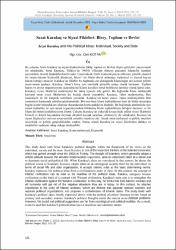Sezai Karakoç ve siyasi fikirleri: Birey, toplum ve devlet
Citation
Kotan, C. (2023). Sezai Karakoç ve Siyasi Fikirleri: Birey, Toplum ve Devlet . Afyon Kocatepe Üniversitesi Sosyal Bilimler Dergisi , 25 (1) , 121-137 . DOI: 10.32709/akusosbil.1049944Abstract
Bu çalışma, Sezai Karakoç‟un siyasi düşüncelerini birey, toplum ve devlete ilişkin görüşleri çerçevesinde
ele almaktadır. Sezai Karakoç, Türkiye‟de 1960‟lı yıllardan itibaren güçlenen İslamcılık hareketi
içerisindeki önemli düşünürlerden birisidir. Genel olarak Batılı modernleşme tecrübesine yönelik eleştirel
bir tutum takınan İslamcılık düşüncesi, İslam‟ı bir bütün olarak anlamayı, toplumsal ve siyasal hayata
hâkim kılmayı amaçlar. Karakoç‟un fikirleri bu bağlamda ele alındığında İslamcılığın söz konusu politik
tasavvurunu paylaşır. Karakoç, İslam‟ı birey için ontolojik güvenlik sahası olarak benimser. Toplum
hayatı ve devlet organizasyonu açısından ise İslami kuralları temel belirleyici normlar olarak kabul eder.
Karakoç, siyasi fikirlerini medeniyetçi bir bakış açısıyla dile getirir. Bu bağlamda İslam medeniyeti
kavramı onun siyasi fikirlerinin üst başlığı olarak okunabilir. Karakoç, İslam medeniyetini, Batı
medeniyeti ile bir karşıtlık temelinde yorumlar. Karakoç‟un temel amacı, İslam medeniyetinin Batı
medeniyeti karşısında yeniden güçlenmesidir. Böylece hem İslam toplumlarının hem de bütün insanlığın
bugün içinde bulundukları olumsuz durumlardan kurtulacaklarını düşünür. Bu bağlamda günümüzde ayrı
ulusal toplumlar ve ayrı siyasi organizasyonlara bölünmüş İslam toplumlarının birliğini önemser ve bir
İslam devletleri konfederasyonu önerir. Çalışma Karakoç‟un yukarıda kısaca ifade edilen siyasi fikirlerini
birincil ve ikincil kaynaklara dayanan eleştirel kaynak taraması yöntemiyle ele almaktadır. Karakoç‟un
siyasi düşünceleri mevcut sosyo-politik sorunları merkeze alır. Ancak onun toplumsal ve politik önerileri
sosyolojik ve politik gerçekliklerden uzaktır. Sonuç olarak Karakoç‟un siyasi fikirlerinin ahlakçı ve
idealist bir mahiyete sahip olduğu söylenebilir This study deals with Sezai Karakoç's political thoughts within the framework of his views on the
individual, society and the state. Sezai Karakoç is one of the important thinkers in the Islamist movement,
which has gained strength since the 1960s in Turkey. The thought of Islamism, which generally adopts a
critical attitude towards the Western modernization experience, aims to understand Islam as a whole and
to dominate social and political life. When Karakoç's ideas are considered in this context, he shares the
political vision of Islamism. Karakoç adopts Islam as an ontological security field for the individual. In
terms of social life and state organization, it accepts Islamic rules as the basic determining norms.
Karakoç expresses his political ideas from a civilizationist point of view. In this context, the concept of
Islamic civilization can be read as the headline of his political ideas. Karakoç interprets Islamic
civilization on the basis of a contrast with Western civilization. Karakoç's main aim is to strengthen the
Islamic civilization against the Western civilization. In this way, he thinks that both Islamic societies and
all humanity will get rid of the negative situations they are in today. In this context, he attaches
importance to the unity of Islamic societies, which are divided into separate national societies and
separate political organizations, and proposes a confederation of Islamic states. The study deals with
Karakoç's political ideas, briefly expressed above, with the method of critical literature review based on
primary and secondary sources. Karakoç's political thoughts center the current socio-political problems.
However, his social and political suggestions are far from sociological and political realities. As a result,
it can be said that Karakoç's political ideas have a moralistic and idealistic nature.
Source
Sosyal Bilimler DergisiVolume
25Issue
1URI
https://dergipark.org.tr/tr/pub/akusosbil/issue/76372/1049944https://hdl.handle.net/11630/10715
Collections
- Cilt 25 : Sayı 1 [25]



















